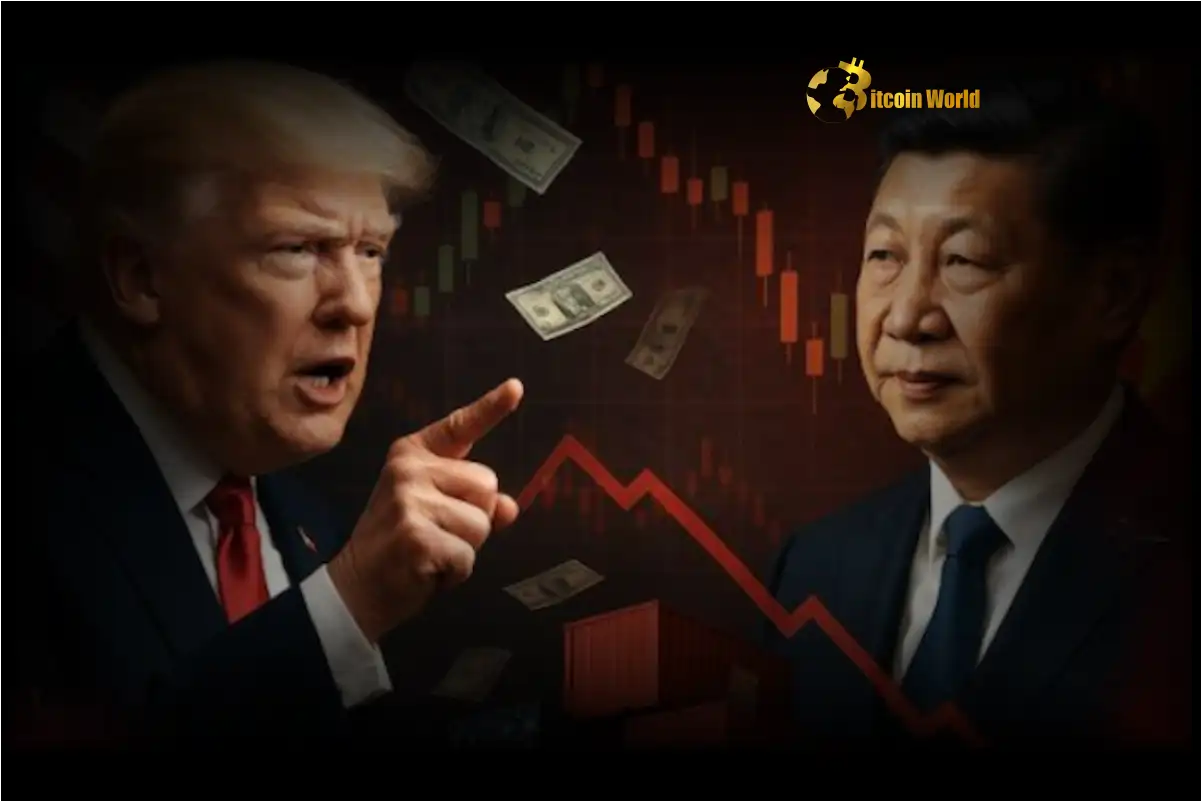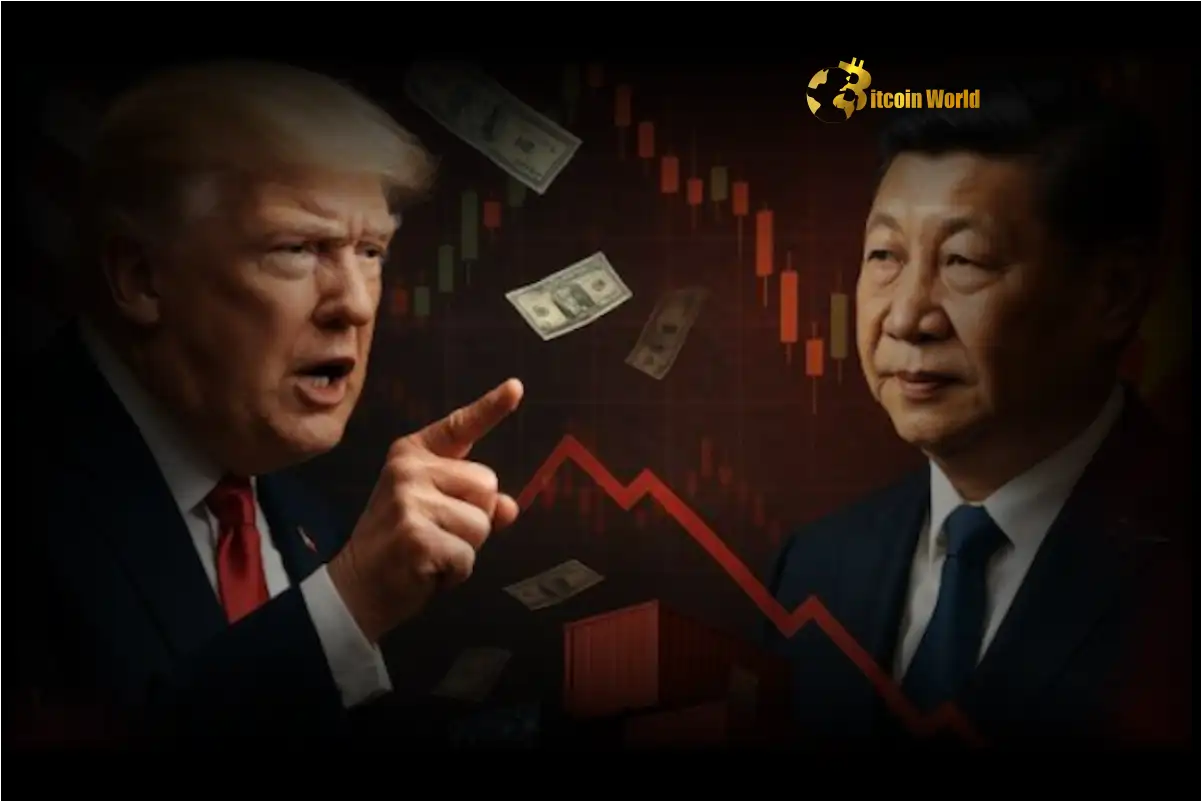In a dramatic escalation of rhetoric surrounding international trade, a recent announcement from the White House regarding tariffs on Chinese imports has been met with outright dismissal and strong words from China. Are we witnessing just political posturing, or is this a serious deepening of the trade rift between the world’s two largest economies? Let’s delve into the details of this fiery exchange and understand what it could mean for global markets and you.
Why is China Calling US Tariffs a ‘Global Joke’?
The core of this dispute stems from a White House fact sheet released on April 15th. This document stated that US tariffs on imports from China could now reach a staggering 245%. However, this figure was swiftly and strongly contested by Niutanqin, a WeChat account linked to China’s state-run Xinhua News Agency. Dismissing the 245% figure as a mere “global joke” and a “word game,” Niutanqin argued that the number is misleading. They claim it’s simply an inflated sum created by adding together existing tariffs with newly proposed ones, implying no actual fundamental shift in policy. Essentially, China is accusing the U.S. of sensationalizing the situation without any real policy change, making the entire announcement seem like a theatrical performance rather than a substantive economic measure.
Decoding the ‘Word Game’: Understanding the Tariff Tussle
To understand China’s frustration and the “word game” accusation, it’s crucial to break down the complexities of China tariffs and the existing trade landscape:
- Pre-existing Tariffs: It’s important to remember that the US has already imposed tariffs on a range of Chinese goods during the previous administration’s trade disputes. These tariffs are not new.
- New Tariffs on the Horizon?: The White House fact sheet likely refers to potential further tariff increases under consideration. However, China argues that these are not yet concrete and are being presented as if they are already in effect to create a stronger impression.
- Combination vs. New Policy: China’s point is that adding old tariffs to proposed tariffs doesn’t equate to a 245% tariff on *new* imports. It’s a cumulative figure, not a reflection of a sudden, drastic policy overhaul.
- Rhetoric vs. Reality: Niutanqin’s post suggests that the US is engaging in rhetorical escalation to appear tough on trade, but the actual economic impact of these tariffs may not be as significant as portrayed.
In essence, China believes the US is exaggerating the tariff situation for political gain, using misleading figures to paint a picture of aggressive trade policy without necessarily implementing genuinely new, impactful measures. This is why they label it a “global joke” – a performance for the world stage rather than a serious policy shift.
The Broader Context: Is a Trade War Really Escalating?
The term trade war has been circulating for years, particularly in discussions about US-China economic relations. But is this recent exchange signaling a genuine escalation? Here’s a balanced perspective:
- Ongoing Trade Tensions: Trade tensions between the US and China are undeniably real and have been persistent. Disagreements over trade imbalances, intellectual property, and market access are long-standing issues.
- Tit-for-Tat Measures: Both countries have engaged in retaliatory tariffs and trade restrictions in the past. This back-and-forth has characterized the trade relationship for some time.
- Economic Interdependence: Despite the tensions, the US and Chinese economies are deeply intertwined. A full-blown trade war would be damaging to both sides and the global economy.
- Negotiation vs. Confrontation: While rhetoric is heated, both nations also understand the importance of dialogue and negotiation. Complete economic decoupling is unlikely and undesirable for both.
While the “global joke” comment is strong, it can also be interpreted as a tactic to downplay the significance of potential US actions and to project an image of strength and resilience. It’s part of the ongoing strategic communication between these global powers.
Xinhua News Agency’s Stance: More Than Just a ‘Joke’?
The involvement of a Xinhua-affiliated account is significant. Xinhua News Agency is the official state-run press agency of China. For an outlet linked to Xinhua to publicly dismiss US tariff figures as a “global joke” indicates a coordinated and high-level response from the Chinese government. This isn’t just a random online comment; it’s a calculated message intended for both domestic and international audiences.
This official stance suggests several things:
- Official Displeasure: China is clearly unhappy with the US tariff rhetoric and perceives it as misleading and potentially damaging to their economic interests.
- Rejection of US Narrative: China is actively pushing back against the US narrative surrounding tariffs, attempting to control the global perception of the situation.
- Signaling Resolve: By using strong language, China is signaling its resolve to stand firm against further US trade pressure and to not be intimidated by tariff threats.
- Domestic Consumption: The strong rhetoric also serves a domestic purpose, reinforcing the government’s image as a strong defender of national interests against foreign pressure.
Navigating the Trade War Landscape: What Does This Mean for You?
Even if labeled a “global joke” by one side, the implications of this trade war rhetoric and potential tariff increases are very real. Here’s what you should consider:
- Market Volatility: Trade tensions often lead to increased volatility in financial markets, including cryptocurrencies. Keep a close eye on market fluctuations and be prepared for potential swings.
- Supply Chain Disruptions: Tariffs can disrupt global supply chains, potentially leading to price increases for various goods and services. This could impact inflation and consumer spending.
- Investment Strategies: Investors should consider the potential impact of trade tensions on their portfolios. Diversification and risk management become even more crucial in uncertain economic climates.
- Geopolitical Uncertainty: The US-China trade relationship is a major factor in global geopolitical stability. Escalating tensions can contribute to broader uncertainty and impact international relations.
Conclusion: Beyond the Rhetoric – The Real Stakes of the Trade Spat
While China’s dismissal of US tariffs as a “global joke” might seem like mere political theater, it underscores the deep-seated tensions and complex dynamics at play in the US-China trade relationship. Beneath the strong words and accusations, lie significant economic and geopolitical stakes that will continue to shape the global landscape. Whether this is truly just a “word game” or a precursor to more significant trade actions remains to be seen, but one thing is certain: the ongoing trade saga between the world’s two largest economies is far from over and will continue to be a critical factor influencing global markets and international relations.
To learn more about the latest crypto market trends, explore our article on key developments shaping Bitcoin price action.
[ad_2]
Source link






